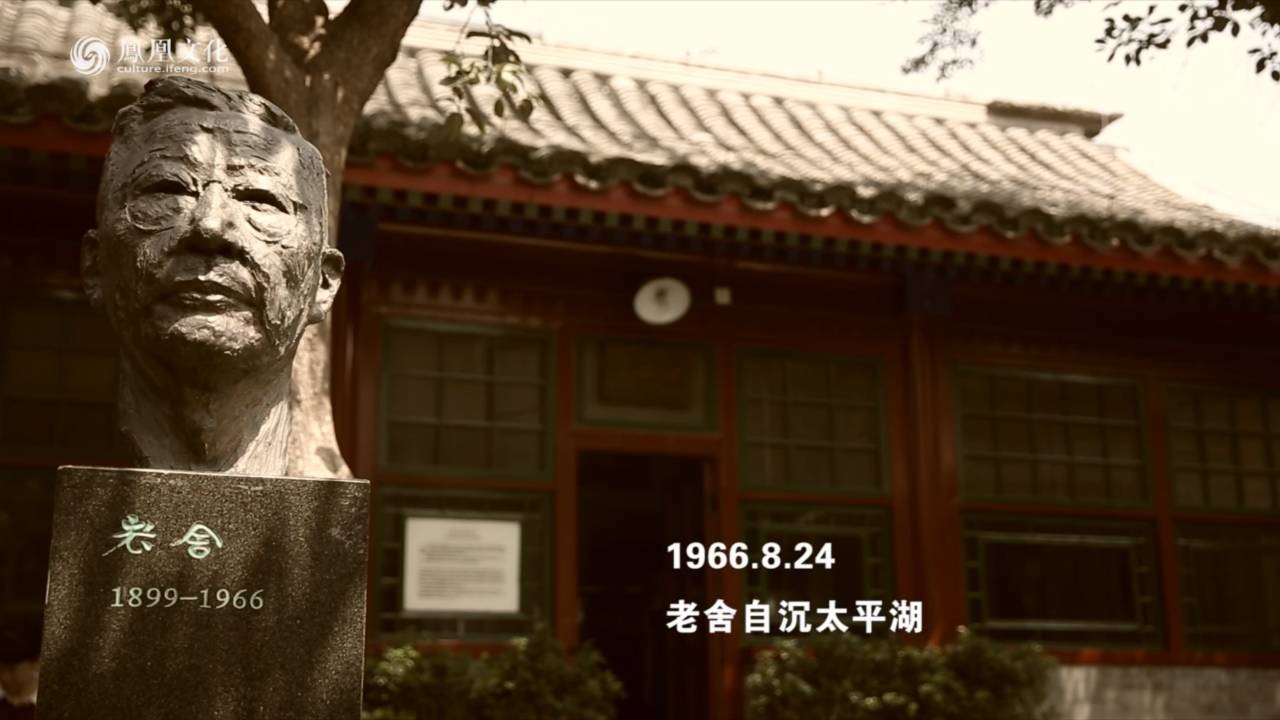
Image from 凤凰文化.
This week marks fifty years since 老舍 Lao She committed suicide by throwing himself into Taiping lake after he was attacked by Red Guards. 凤凰文化 (the Culture branch of Phoenix New Media) has put together a retrospective featuring video interviews with figures such as 葛献挺 Ge Xianting, another member of the Beijing Literary Federation who was present that day, and assorted opinion pieces:
Fifty years on, the people personally involved in that famous “Red August” are now aging or have passed away. If the truth exists only in their memories, then that generation’s departure signifies the loss of a piece of history. Lao She’s death becomes a diluted legend.
In 1984, Orwell wrote: “He who controls the past, controls the future.” If it is not too late, we hope to look back on history, and reawaken memories. On the August 23rd of fifty years ago, what violence and humiliation was Lao She subjected to, to make him step into the icy lake in the midnight hours of the 24th?
The longest piece is a 7,000 character essay by 傅光明 Fu Guangming, in which he expostulates on how John Miles Foley’s ideas on oral histories apply to his own investigation into Lao She’s death:
What time did Lao She arrive at the Literary Federation that day? Answers differ. Did his driver come to pick him up, or did he take the bus? Accounts vary. Was he wearing a white shirt, a blue shirt, or a suit? Answers differ. Did Lao She fail to return home in the middle of the day because of a drivers’ strike, or for some other reason? Everyone has his or her own version […] Who at the Literary Federation made the call to the Red Guards that day? This remains an unsolved mystery.
Tony Blishen’s translation of the Lao She story “Mr Jodphurs” was the 28th story in season 1 of the Read Paper Republic project.
Ian Johnson's introduction to Lao She’s sci-fi fable Cat Country (adapted in the NYRB) also describes Lao She’s death. Jeffrey Wasserstrom mentions Cat Country in “Dystopian fictions in the time of Trump”, a recent TLS blog post.


Comments
" 老舍之友、日本作家井上靖1970年写了一篇题为《壶》的文章怀念老舍,说他终于领悟了老舍曾讲给他们听的中国人宁肯把价值连城的宝壶摔得粉碎也不肯给富人去保存的故事。日本作家开高健以老舍之死为题材写了一篇题为《玉碎》的小说,获1979年川端康成奖。"
《骆驼祥子》的版本变迁 ——从出版与接受的角度考察 孔令云 http://www.literature.org.cn/article.aspx?id=38070
susan, August 29, 2016, 1:14p.m.
吴永平:老舍小说《抓药》新解 2016-04-13 09:56:12 进入专题: 老舍 《抓药》
● 吴永平
【内容提要】 老舍的短篇小说《抓药》是一篇形式和寓意都很奇特的作品,在双线双关的结构形式 下隐藏着一个神秘的内核:他对革命文学运动的真实态度,对当时发生的左翼文坛与“ 自由人”、“第三种人”论争的看法,对自己近期作品创作动机的表白及对于批评者的 答复。 【关 键 词】老舍/《抓药》/自由派作家/左翼批评家 《抓药》,发表于《现代》5卷1期(1934年5月)。这篇作品没有收入老舍其后自编的短 篇小说集《赶集》(1934年9月)或《樱海集》(1935年8月)中。根据老舍选文的习惯,未 收集的小说大抵因其内容涉及到个人经历与心境,时过境迁,便有意将其遗忘,类似未 收集的作品还有《小铃儿》《生灭》等。《抓药》是篇结构和命意都相当奇特的短篇小 说,这篇作品长期以来没有得到老舍研究者们的重视。
http://www.aisixiang.com/data/98686.html
susan, August 29, 2016, 10:57p.m.
老舍眼里的鲁迅:巍巍乎如山 茫茫兮似海 谷林先生在《鲁迅纪念会》一文中,记载了1945年重庆知识界纪念鲁迅的片段,其中有一件老舍的旧事,很是有趣。他谈到了老舍朗诵《阿Q正传》的片断,其中有云:
说是朗诵,可是发音不高,也没有那种诗人气派的抑扬顿挫,显得沉静温雅,字句却分外清晰,听来直沁心脾。几十年过去了,犹若余音绕梁,平生机遇,仅此一遭。《阿Q正传》当然无人不晓,小说里原本很有些逗乐传神的描述,意想不到的是经过老舍口传,旧篇恍成新章,一座尽靡,无不开怀绝倒。朗诵之前,老舍还有一段开场白,也是同样声腔,反响热烈如潮,他说罢一句,满座便是一阵哄笑,老舍则纹丝不动,少俟片刻,再以平易的音调,续发蕴藉的妙绪,递推以迄终场。
http://culture.people.com.cn/GB/40565/85832/8956051.html
susan, August 29, 2016, 11:16p.m.
Посвящается 115-летию со дня рождения Лао Шэ (1899–1966)
susan, September 6, 2016, 8:09p.m.